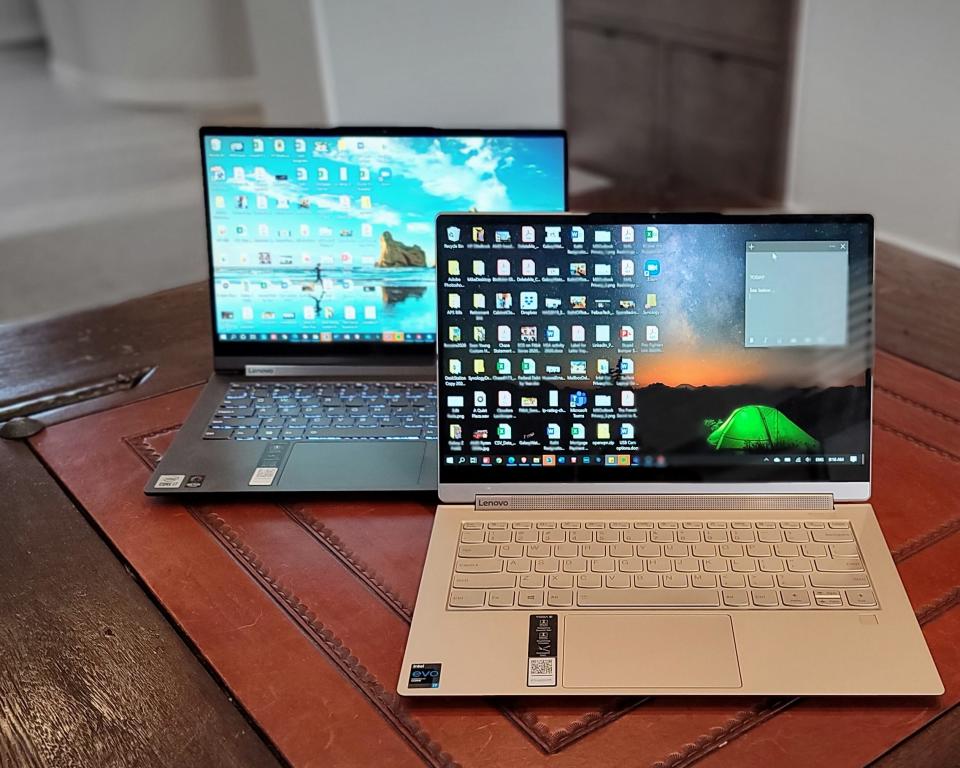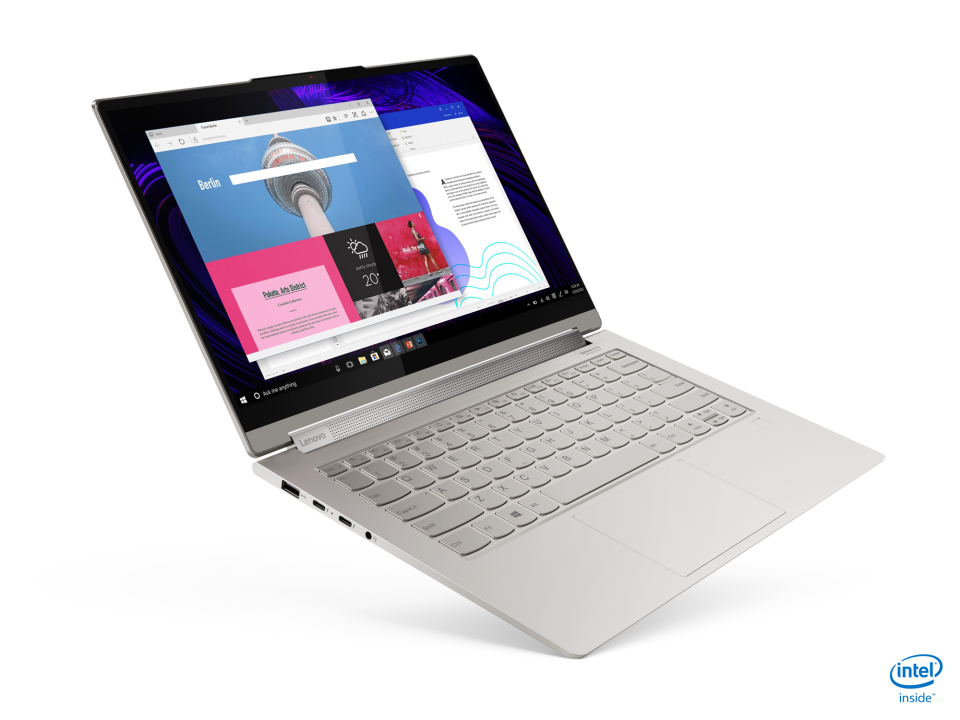These computers lap the competition: New laptops faster than last-gen PCs
For the second time in as many generations, new laptops are leapfrogging last year’s models with zippy responsiveness, snappy performance and better battery life.
I have to say, I was impressed with last-generation laptops – the first crop of Intel-based systems tuned for how we actually use PCs – when they first came out. But now, after conducting side-by-side tests between one of those 10th-generation Intel Core-based systems and an 11th-generation Core laptop just now coming to market, I’m flat-out amazed at the difference.
The new system, the just-released Lenovo Yoga 9i ($1,379 as configured), is always ready for work, even before I can get the lid open. Applications open, close and run quickly. The system runs quiet and cool. It charges super quickly. Battery life has been great, with active time consistently registering in the nine-to-11-hour range. And that’s with all the applications I’m using all open and scattered across the bright, spacious 14-inch display.

The similarly-equipped Yoga C940 ($999 as configured) served as the last-gen laptop in my head-to-head comparison. Response was good, though not nearly as bankable. Performance likewise was good, albeit at a sizable click down. Battery life turned out to be more variable than with the Yoga 9i. And the cooling fan kicks on frequently. It didn’t change how loudly I needed to speak, or at what volume I needed to play music. But I certainly knew the C940 had a fan. Not so with the 9i.
After five days with the 9i, in fact, I actually checked with Lenovo to confirm it indeed had a fan. It’s since kicked on while producing video – which it completed more than 20 percent faster than the C940 – and also when plugged in and connected to my large external display.
Smart speakers: Is it Alexa, Google or Apple for you?
Tired of 2020?: 11 tech tools to help make the holidays more jolly
Made for what we do
Both systems are the product of a multi-year initiative led by Intel to help get PC makers off the treadmill of building laptops that log high scores on artificial benchmarks but are ill-fitted for what we do every day.
The campaign, called Project Athena, is setting goals for laptop battery life, performance and responsiveness, and optimizing the platform to meet those goals. Project Athena requires, for example, at least nine hours between charges. And that’s with lots of apps running at once, with the screen set to a well-lit 250 nits. (As it happens, that’s 81 percent brightness on the Yoga 9i, and 89 percent on the C940.)

The Yoga 9i blew past those goals in my test setup, while the C940 merely came close. The primary difference, aside from a more powerful, energy-efficient 11th-generation computing platform, is that the new-and-improved Project Athena spec covers more of what’s happening on my desktop. And, probably, yours too.
Intel has also made it easier to find laptops that conform to the latest Project Athena ideals by tagging them with a new brand, Evo. There are no identifying markings on 10-gen Project Athena systems like the Yoga C940, so they’re harder to spot.
The original Project Athena spec for C940-class systems focused on multiple apps running simultaneously, including the Chrome browser with lots of open tabs, Netflix streaming, productivity apps and suites like Office 365 and Google Docs, along with email and social media.
Evo-branded systems like the Yoga 9i also have to perform on all that and more, including video collaboration tools like Zoom and cloud storage apps like Dropbox and Microsoft OneDrive.
The larger, more inclusive list of apps covers a lot more of what I do every day, which helps explain why the Yoga 9i meets or exceeds all expectations. During a typical workday, I’ll have Outlook, Word, Excel and Microsoft Teams all running, along with Adobe Acrobat DC, NordVPN, Spotify and Todoist. As well, I’ll have tabs opened in two browsers, Microsoft Edge and the privacy-minded Brave browser.
More than anything, though, the three cloud storage services running on my desktop – Dropbox, OneDrive and Synology Drive, which syncs with my private cloud appliance – really seemed to be what separated the two systems.
Ignorance is bliss?
The 9i is by far the most complete PC I’ve ever had the pleasure to use. It’s light, sleek, cool and quiet, with disarmingly consistent battery life and no-wait performance.
With that as a backdrop, it’s important to understand that as recently as just a few weeks ago, I was content with what laptops in the C940 class offer. Sure, it occasionally needed 10 seconds to come back to life. And sometimes the charge burned quicker than expected, forcing me to shut down and pack up before I was ready. But it was good, with no obvious shortcomings. And I was happy.
And then the Yoga 9i arrived and changed everything. And now I can’t go back.
All of this is to say that if you’re in the market to replace your laptop this holiday season, systems in both the C940 and 9i class will delight you. But if you don’t intend on spending the extra few hundred dollar for a device like the 9i, then don’t even glance in its direction. Because it will spoil your purchase.
Consider yourself warned.
USA TODAY columnist Mike Feibus is president and principal analyst of FeibusTech, a Scottsdale, Arizona, market research and consulting firm. Reach him at mikef@feibustech.com. Follow him on Twitter @MikeFeibus.
This article originally appeared on USA TODAY: New laptops lap PC rivals with snappy performance, better battery life

